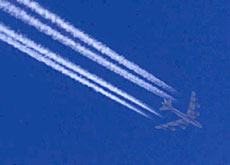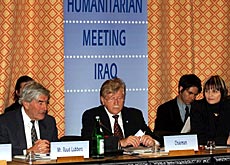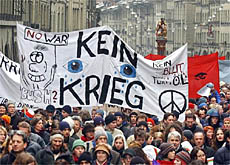Iraq debate has Swiss grappling with airspace issue

The heated public debate over Iraq has Switzerland's political establishment divided over whether to open Swiss skies to US aircraft in the event of war.
The defence ministry has confirmed that it received a request from Washington for permission to use Swiss airspace.
The threat of war has dominated public debate for weeks, although much of it is tempered by the reality that Switzerland has little say in world events.
Beyond humanitarian initiatives, Switzerland’s ability to influence the crisis surrounding Iraq is essentially limited to the question of fly-over rights.
Switzerland barred US-led Nato forces from flying over the country during the 1999 conflict in Yugoslavia – in accordance with Swiss neutrality.
As the United Nations Security Council this week debates Iraq’s alleged weapons programme, the Swiss government is again faced with the sensitive question of how to react to any war, not least because the Swiss joined the UN last year.
Adding to the pressure on the government is strong public opposition to war – recent Swiss opinion polls show 80 per cent are against US-led strikes on Iraq.
“Delicate” politics
Dieter Ruloff, international relations expert at the University of Zurich, told swissinfo that Switzerland would be obliged to grant fly-over rights if the UN mandates a war.
“[However,] if the US acts alone, then [there would be] no over-flight rights. This is exactly the path other neutral countries will follow,” says Ruloff.
Much of Switzerland’s political debate on a no-fly zone centres on what would happen if the US attacked Iraq without a UN mandate.
“This is a very delicate issue,” says Christian Weber, a spokesman for the centre-right Radical Party.
Weber told swissinfo that Switzerland should not decide on restricting its airspace until the UN makes its final decision on any potential conflict.
“In Switzerland we are condemned to watching [the result on Iraq]… and one cannot know whom to believe,” Weber says.
“If we set our position in stone now, we are only handing out blank cheques and limiting our own room to move.”
Ruloff agrees: “In my personal view Switzerland would be wise not to overplay its hand in this.”
Calls for a blanket ban
The Radical Party’s stance contrasts with that of the rightwing Swiss People’s Party, which insists that the Swiss government impose a ban.
Yves Bichsel, a People’s Party spokesman, told swissinfo that the Swiss public supports a ban, particularly in the wake of last weekend’s anti-war march in Bern, where some 40,000 people took to the streets in one of the biggest public protests in 20 years.
“After this eventful weekend… it is clear that is would be unacceptable if Switzerland didn’t use its right to impose a no-fly zone,” Bichsel says.
“This would also be the case in the event of a second UN resolution.”
The People’s Party’s position echoes that of Switzerland’s centre-left Social Democrats.
“Illegitimate” war
Jean-Philippe Jeannerat, a spokesman for the Social Democrats, says there should be no military fly-overs without a second UN resolution.
However, Beatrice Wertli from the Christian Democrats warns that Switzerland must act according to its UN obligations.
“A war has no legitimacy other than through the UN. Without a second resolution, there is absolutely no question that no fly-over rights can exist.”
A Swiss parliamentary committee is due to debate the issue when the parliament opens its spring session on March 3.
swissinfo, Jacob Greber
Debate has started on whether Switzerland should impose a no-fly zone above the Alps if the US attacks Iraq without a UN mandate.
Parties supporting a no-fly zone include the right-wing People’s Party, the centre-left Social Democrats and the centre-right Christian Democrats.
The centre-right Radical Party says the issue is “too delicate” for any decisions at this stage.
Parliament is due to discuss the issue during its March session.

In compliance with the JTI standards
More: SWI swissinfo.ch certified by the Journalism Trust Initiative




You can find an overview of ongoing debates with our journalists here. Please join us!
If you want to start a conversation about a topic raised in this article or want to report factual errors, email us at english@swissinfo.ch.